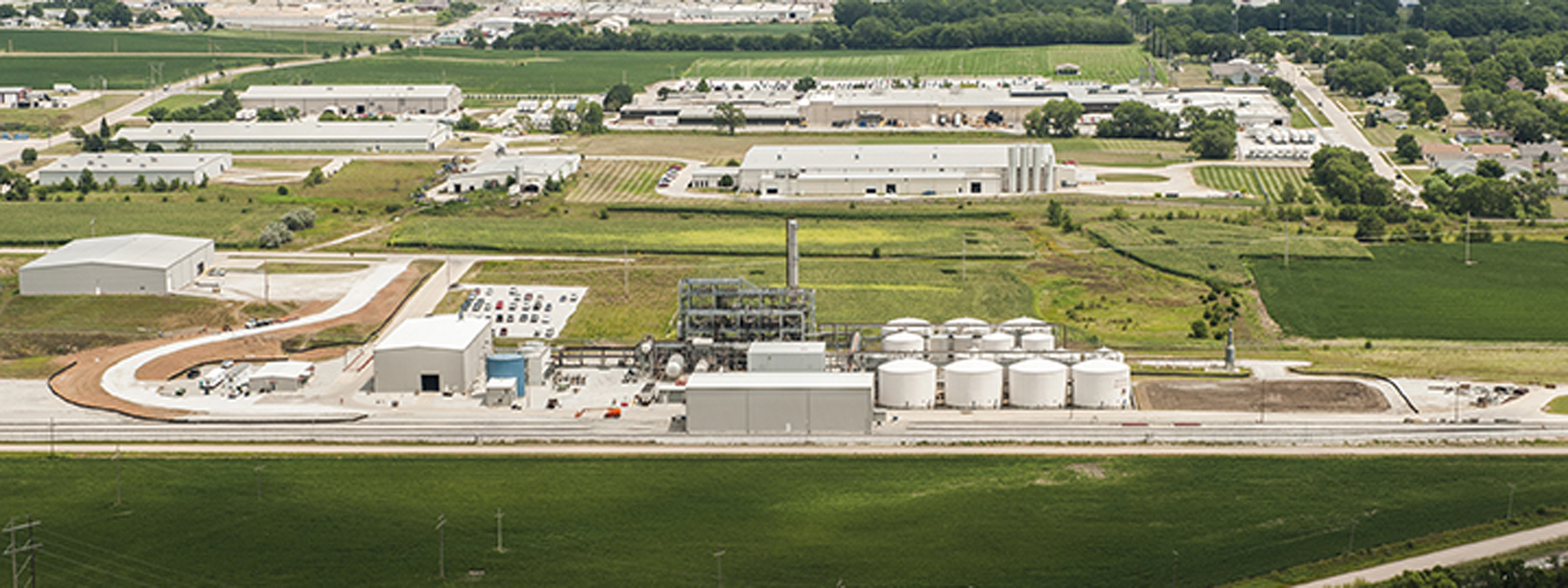
May 7, 2014
Flint Hills Resources announced today the first commercial-scale use of an innovative biodiesel technology through a joint venture with Benefuel® Inc. known as Duonix LLC. Flint Hills Resources will begin retrofitting the Beatrice, Nebraska, biodiesel plant for a planned commencement of operations during the summer of 2015. Once the Duonix Beatrice plant is operational, it will produce approximately 50 million gallons of biodiesel each year and employ about 45 people in the local community.
Since 2010, Flint Hills Resources has worked with Benefuel® Inc. to test and validate their innovative, patented and proprietary, biodiesel technology. Benefuel’s ENSEL® technology updates 75-year-old chemistry to provide an exciting new process for next-generation renewable fuel and industrial chemicals production. The technology is unique because it allows the use of lower cost, high free fatty acid (FFA) feedstocks such as animal tallow, unrefined oils, used vegetable oils or distillers corn oil—a coproduct of ethanol manufacturing—to produce highquality biodiesel. This is accomplished through the use of a solid catalyst that combines esterification and transesterification into a single step, which has been a long-standing goal of the biodiesel industry. The process also ensures the final product meets or exceeds all domestic and European biodiesel standards.
“We are pleased that our Beatrice, Nebraska, facility will have the opportunity to bring this innovative technology to life,” said Brad Razook, president of Flint Hills Resources. “We look forward to demonstrating the technology’s commercial application and beginning production.”
Feedstock prices are a top driver in the cost associated with producing biodiesel. Benefuel® Inc.’s technology allows producers to use lower-cost feedstocks to generate higher yields and improve profit margins. The use of lower-cost feedstocks also opens new markets for feedstock producers.
“Benefuel’s goal has always been to improve the profitability of biodiesel by reducing the operating costs to produce it,” said Rob Tripp, chief executive officer of Benefuel® Inc. “For News Release more than six years, we have worked to develop a product we believe will improve the profitability of biodiesel, slow resource consumption and cut waste.”
Benefuel® Inc. is the exclusive owner of the patented, process to use a solid catalyst to produce biodiesel and biolubricants, which was developed by the National Chemical Laboratories and is produced by Süd-Chemie (now part of Clariant).
Flint Hills Resources acquired the Beatrice biodiesel plant out of bankruptcy in 2011. The plant was originally built in 2008, but was not finished and never operated. In May 2013, Benefuel® announced a joint venture with Flint Hills Resources, known as Duonix, LLC, to develop domestic biodiesel production capabilities. Duonix Beatrice will be the first joint commercial venture from the companies.
The Duonix joint venture was formed to leverage Benefuel’s leading ENSEL biodiesel refining technology with Flint Hills Resources operating experience to become a leader in the U.S. biodiesel industry, through the construction of new facilities and/or acquisition and retrofit of existing facilities.
About Benefuel® Inc.
Benefuel® Inc. is based in Irving, Texas and is a biodiesel process technology and production company with exclusive, patented global rights to next-generation technology for manufacturing biodiesel and bio-lubricants. Benefuel® ’s patented ENSEL process produces biodiesel at a substantially lower cost than conventional methods by using lower cost, high free fatty acid feedstocks and converting them efficiently into biodiesel and glycerin.
About Flint Hills Resources
Flint Hills Resources, LLC, through its subsidiaries, is a leading refining, chemicals and biofuels company. Its subsidiaries market products such as gasoline, diesel, jet fuel, ethanol, biodiesel, olefins, polymers and intermediate chemicals, as well as base oils and asphalt.
Flint Hills Resources operates ethanol plants in Arthur, Fairbank, Iowa Falls, Menlo and Shell Rock, Iowa; and Fairmont, Neb. The plants have a combined annual capacity of 650 million gallons of ethanol. The company has also made equity investments in bioenergy companies working to innovate and optimize biofuel production.
The refining business operates refineries in Minnesota (Rosemount) and Texas (Corpus Christi), with a combined crude oil processing capacity of nearly 670,000 barrels per day. The petrochemical business includes production facilities in Illinois, Michigan and Texas. The asphalt business produces and markets product in the Midwest and Alaska. A subsidiary owns an interest in a lubricants base oil facility in Louisiana.